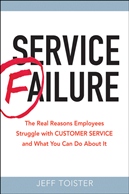How quickly should you respond to an email?
 Jeff Toister
Jeff Toister  Thursday, April 18, 2013 at 7:50AM |
Thursday, April 18, 2013 at 7:50AM | Nearly 75 percent of us expect co-workers to respond to emails within four hours or less, according to a recent email response time survey. This is a slight increase from 2012’s results, where 68 percent of respondents expected a response within the same time frame.

One surprise in this year’s survey was respondents belonging to Generation Y (born 1977 or later) didn’t skew the results with their high expectations for quick responses. In 2012, 43 percent of Generation Y respondents expected co-workers to respond to email within 1 hour, but that number was down to 29 percent in 2013.

People have a little more patience when it comes to receiving a response to emails sent to a business, but 90 percent of us still expect a response within one day.

The survey also asked how quickly we expect our friends to respond to email. Here, we are a bit more lenient with an average expected response time of 1.25 days.

What does all this mean?
Businesses should respond to customer emails within at least one day. A future target should be four hours since nearly 90 percent of customers expect a response within that time frame. The caveat is a quick response does nothing for a customer if it’s not a good response. Several months ago, I documented an email service failure where the company was responding in less than 20 minutes.
Co-workers must also be careful with their high expectations for response times. Constantly checking email can be unproductive and lead to more errors. In many cases, the rush to respond quickly generates more email than necessary to answer a question or provide the requested information.
You can find some additional resources from a few of my previous posts on managing customer service email and my top 10 ways to avoid email overload.









